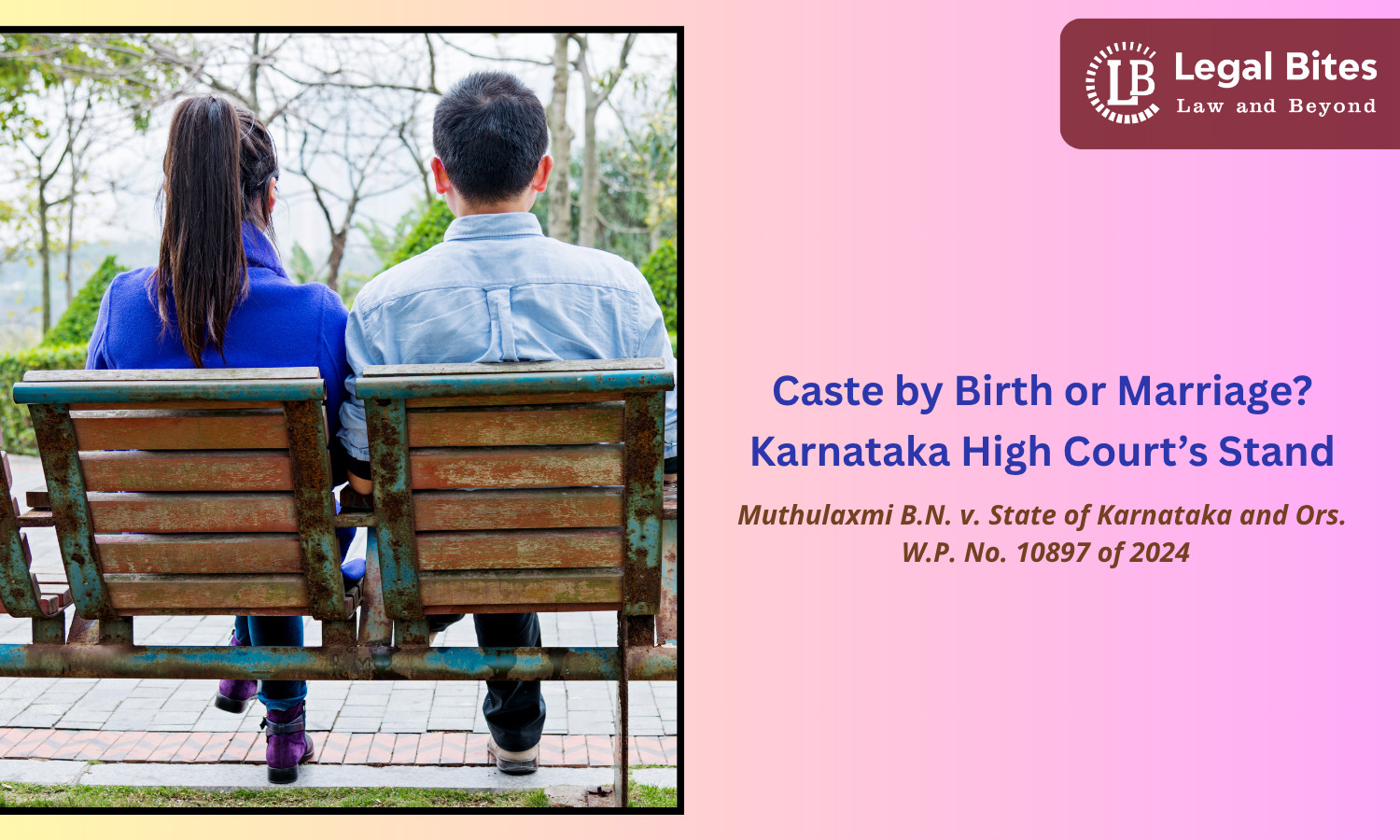
The denial of caste certificates based on a woman’s marital status or her husband’s income continues to generate legal debate and bureaucratic confusion in India. A caste certificate is a crucial document for availing of various constitutional benefits extended to members of the Scheduled Castes, Scheduled Tribes, and Other Backward Classes (OBCs).
The recent decision by the Karnataka High Court in Muthulaxmi B.N. v. State of Karnataka and Ors. (W.P. No. 10897 of 2024, decided on 8 July 2025) emphatically clarified that a woman’s right to a caste certificate cannot be negated on the basis of her husband’s income. This article explores the legal implications of the judgment, the principles involved, and the broader message for public administration and gender justice.
Background of the Case
Muthulaxmi B.N. applied for the post of Assistant Public Prosecutor in Karnataka under Category 3A. Though she was selected in the merit list dated 17 January 2023, her appointment was withheld due to the non-issuance of a caste and income validity certificate. The reason cited for the denial was that her husband’s income exceeded the prescribed threshold for the backward class category.
She had uploaded all documents on the Seva Sindhu portal and submitted the same to the Taluk Caste and Income Verification Committee. However, rather than evaluating her parental background, the authorities focused on her husband’s income, thereby rejecting her application. This led to a delay of 12 months in her appointment, prompting her to file a writ petition in the High Court.
Issue
- Can a woman be denied a caste and income validity certificate because her husband’s income exceeds the creamy layer threshold, despite her being born into a backward class family?
Court’s Ruling
Justice M. Nagaprasanna of the Karnataka High Court categorically held that the rejection of the validity certificate on the basis of the husband’s income was unlawful. The Court made the following significant observations:
- Caste is determined by birth and not by marriage.
- Income of the father (not the husband) is to be considered while determining the creamy layer status.
- The conduct of the authorities amounted to willful ignorance of well-settled legal principles.
The Court directed the issuance of the validity certificate and imposed exemplary costs of ₹2,00,000 on the erring officials to be paid from their personal funds, not the State treasury.
Judicial Precedents Referred
- Surinder Singh v. Punjab State Electricity Board [(2014) 15 SCC 767]: Held that the creamy layer determination must consider parental income, not that of the individual or spouse.
- Ashoka Kumar Thakur v. State of Bihar [(1995) 5 SCC 403]: Upheld the Government of India’s Office Memorandum of 1993 which laid out the criteria for identifying creamy layer among OBCs.
- Sunita Singh v. State of Uttar Pradesh [(2018) 2 SCC 493]: Ruled that caste by birth cannot change by marriage; a general category woman marrying a Scheduled Caste man does not become SC.
- Akshata Chougala v. State of Karnataka [2023 SCC OnLine Kar 168]: Karnataka High Court reprimanded the state for repeatedly denying caste certificates based on spousal income despite settled law.
Key Highlights of the Judgment
“It is a case where the members of the Committee must be mulcted with exemplary cost. The Chairman and the Members who have deliberately ignored the law, as a result of which, the petitioner is driven to unnecessary litigation and a consequential loss of 12 months of her employment, shall bear the costs.
The cost not to be paid by State, but by the Members of the District Caste and Income Verification Committee, Hassan District, headed by the Deputy Commissioner at the relevant point in time from their pockets. Imposition of exemplary cost has become necessary in the peculiar facts of the case, not only to recompense the petitioner, but become a cautionary call to all those who hold public office, that dereliction cloaked in ignorance shall find no refuge before this Court.”
Significance of the Judgment
This judgment reiterates a fundamental principle of social justice jurisprudence: individual identity and birth-based caste status cannot be nullified by marriage. Women are not extensions of their husbands and their eligibility for constitutional benefits must be evaluated based on their parental background, not their spouse’s financial standing.
It also reinforces the judiciary’s role in holding bureaucratic systems accountable when they violate settled principles of law. The imposition of personal costs on erring officials is a progressive move to deter administrative arbitrariness.
Impact on Women’s Rights
This case has a broader gender justice dimension:
- It acknowledges that women retain their parental identity post-marriage.
- It protects women’s access to education and employment opportunities through reservation.
- It combats patriarchal assumptions in administrative processes.
Administrative Accountability
The Court expressed strong disapproval of the committee’s actions:
“The denial of validity certificate to the petitioner – the key that would unlock the door to her lawful appointment – was premised on a legal fallacy.”
By directing the cost to be paid personally by the officials, the Court sent a clear message that public power must be exercised following law.
Implications for Public Administration
- Authorities must follow Supreme Court and High Court rulings while issuing caste and income certificates.
- Government orders that contradict judicial precedents cannot be used to deny citizens their rights.
- Training of verification committee members on legal compliance is essential.
Conclusion
The Karnataka High Court’s decision in Muthulaxmi B.N. is a watershed moment in the jurisprudence of caste certificates, creamy layer determination, and gender justice. It restores the constitutional promise that no citizen shall be denied benefits of social justice due to administrative ignorance or bias.
It is hoped that the judgment will serve as a precedent and a warning to other states and authorities that continue to act in violation of established legal norms. Women’s rights, caste-based entitlements, and the rule of law must be respected, and this judgment reinforces just that.
Important Link
Law Library: Notes and Study Material for LLB, LLM, Judiciary, and Entrance Exams